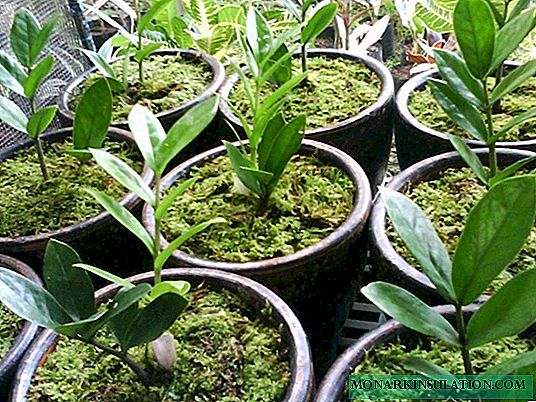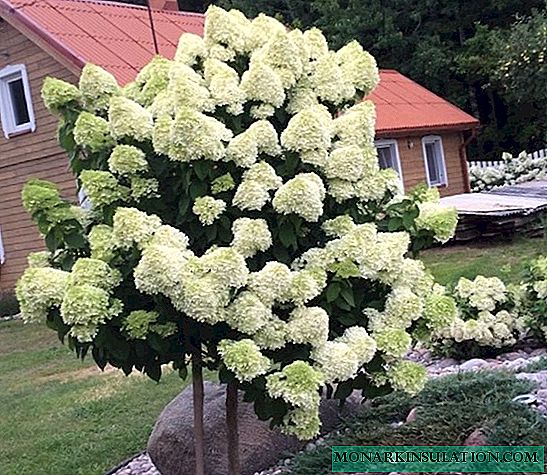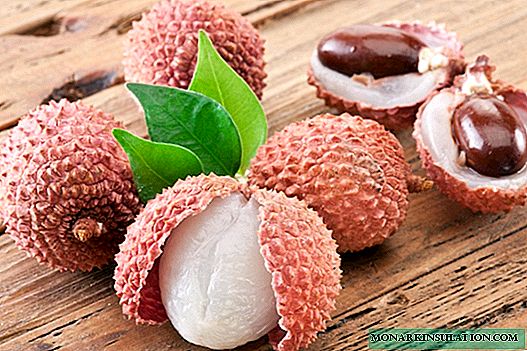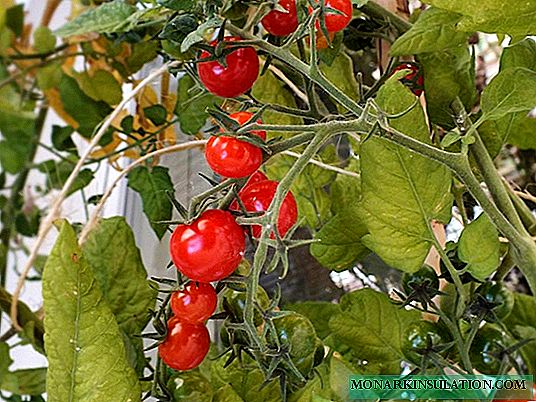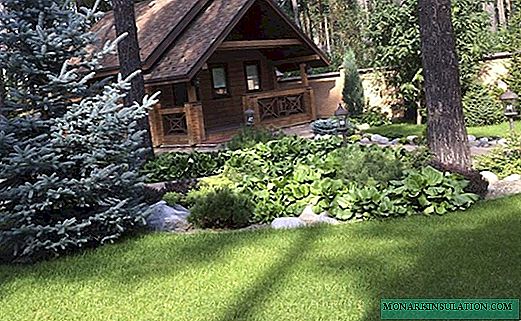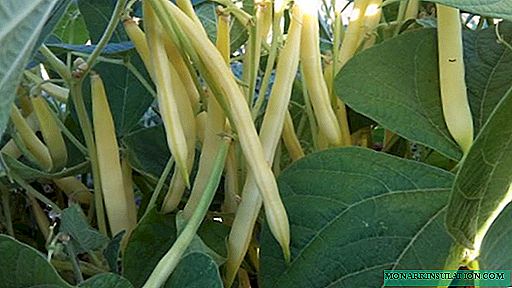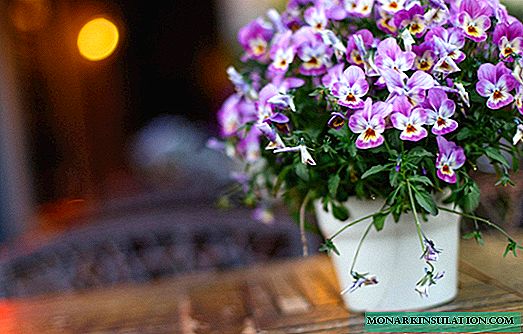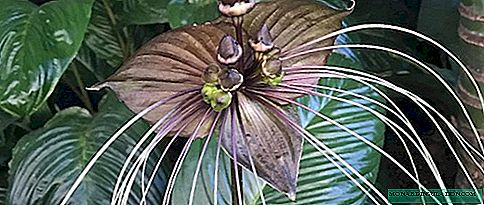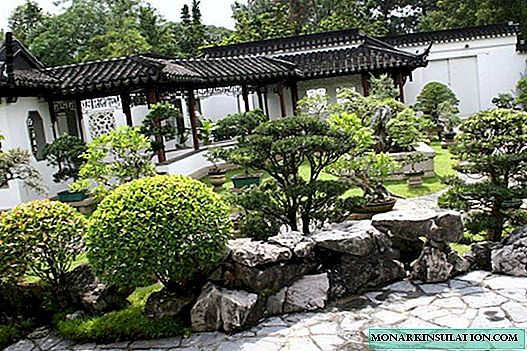Hovea palm tree in the wild lives only on the coastal sands and volcanic rocks of the very small Lord Howe Island, located in the Tasman Sea between Australia and New Caledonia, which allowed it to be attributed to endemic plants, that is, to those found on very limited area. The capital of the island - Kentia gave the second name to the palm tree - Kentia.
Home-grown Howea species
The Howea flower belongs to the genus of palm trees, the Areca family. This is one of the largest families of flowering plants, in the homeland it grows up to 15 meters tall.

Howea on Lord Howe Island
A trunk with cicatricial framing rings, from which grow large pinnate leaves up to 4.5 m long.
Hanging inflorescences appear in the axils of the leaves, and fruits are formed. The sight of magnificent palm trees attracted the attention of the colonists of Western Europe, so the beauty found herself far from home and gained popularity in the Old World.
The hovea house palm in growth (up to 3 m) is significantly inferior to the plant that grew on the island, without losing its southern flavor and charm.
There are 2 species grown at home:
- Howra Forster;
- Howe Belmore.
Howe Forster
Another name - Forsteriana, in nature grows up to 15 m. The trunk is straight, with the same diameter over the entire height. A wide leaf plate of a rich dark green color, cirrus, slightly curved, its length reaches 2.5 m, attached to petioles up to 1.5 m long.
This species is more resistant to cold, tolerates a temperature drop to 10 ° C without consequences.
Additional Information. In greenhouse conditions, produces inflorescences and even bears fruit.
Howe Belmore
This palm is low, reaches 10 m in nature. The trunk at the base is wider.
A leaf up to 4.5 m long consists of several narrow leaves forming a leaf plate curved down, which is located on a short petiole no more than 40 cm.

Lush inflorescences of Howe Belmore
The growth rate in the rooms is slow, with a favorable indoor climate can reach 3 m.
Howea breeding
Howea propagation can be implemented:
- Sowing seeds;
- Planting or dividing the bush.
Dividing the bush
Important! Planning a seating is recommended in April-May.
Pre-prepared mixture consisting of:
- Leaf humus - 2 parts.
- Sod land - 1 part.
- Perlite - 2 parts.
A container is selected with a volume corresponding to the size of the root system of the palm.

Howia propagation by dividing the bush
The following operations must be performed sequentially:
- Carefully remove the plant from the pot.
- Shake the root ball lightly to show off the ground.
- Continue to remove soil from the roots by hand, so as not to damage the roots.
- Carefully divide the plant into parts, avoiding damage to the roots and making sure that they do not dry out.
- Plant the delenki in prepared dishes with the soil mixture.
- To water.
Rooting occurs when:
- Bright but diffused light.
- Temperature 20-25 ° C.
- Humidity at 50%.
Planting should be watered when the mixture dries to a depth of 2 cm. Keep away from drafts. Rooting will occur in 1-2 weeks. Rooted seedlings are fed, preparing a solution with the addition of half the dose of fertilizer needed for an adult plant.
Sowing seeds
This method is not always successful and time-consuming. Seeds retain germination for six months. They are soaked in water for 5 days. Pots to choose with a capacity of not more than 200 ml. Prepare the soil, consisting of sheet earth, perlite and vermiculite in a ratio of 1: 1: 1. Fill containers, not reaching the top of 1.5 cm, moisten. To better ascend, slightly damage the hard shell of the seed with a file. Sown one at a time, deepened and slightly sprinkled with earth. Cover with a film or glass on top, creating inside humidity up to 100%.
Additional Information. Usually no more than half of the sown seeds germinate. Soil treatment with fungicides with lower soil heating increases germination.
For successful germination it is necessary:
- Maintain the temperature of air and soil not lower than 27 ° С.
- Provide partial shade.
- Ventilate daily.
- Make sure that the soil does not dry out.
The probability of emergence within 6 months. When the seedlings grow to 2-4 cm, they are transplanted into containers intended for an adult specimen.
During the spring and summer of the first year, seedlings are placed in partial shade.
Howea transplant at home
Young specimens are transplanted every year, preferably in the spring, handling in a larger pot with an earthen lump.
For two - and three-year-olds, once every two years is enough, for adults - once every 5 years. A mixture of turf land, sand and peat is used for this. When replanting a plant, do not forget about drainage. To update the substrate, the top layer is changed annually.
Important! When transplanting palms, the trunk is deepened to the same level. The capacity value is selected according to the root coma.
Care Tips
An unpretentious javea flower easily adapts in poor conditions, it is easy to care for it.
To grow an attractive flower, you must follow certain rules:
- Maintain the temperature in the summer to 24 ° C, in the winter of 16-18 ° C.
- Water only with warm water.
- When air is dry, spray.
Over time, the Howea leaves begin to dry and die, which is considered natural. In this case, the number of dried and newly grown leaves should be the same.
At low humidity, the ends of the sheet dry, they are neatly trimmed. Regularly wipe the leaves with a damp sponge, sometimes use a shower.

Howe at home
The plant is sensitive to tobacco smoke and the smell of musty and requires constant ventilation, but drafts should be eliminated.
Watering
The best water for irrigation Howe is considered rainwater. It is allowed to use boiled filtered water.
In the warm season, with active vegetation, abundant watering is needed. Watering twice a week will be sufficient. In autumn and winter, water is watered as the soil dries, but you can not bring the earthen coma to full drying. It is necessary to take into account the temperature: when it is reduced, watering is reduced.
Humidity for Howea
In spring and summer, in addition to watering, a plant needs high humidity, it is created by spraying.
Note! In the cold season, spraying is not used, they are resumed if the room temperature exceeds 22 ° C.
Seat selection
Placing a palm tree anywhere in the house is suitable for its habitat. On the south side in the heat you need to create a shadow. In winter, additional lighting is used, including a fluorescent lamp.
Proper lighting
The palm is shade-tolerant, any room is suitable for growing it, but in a shaded place growth will slow down. Suitable for placing a flower will be a place with the presence of intense diffused light.
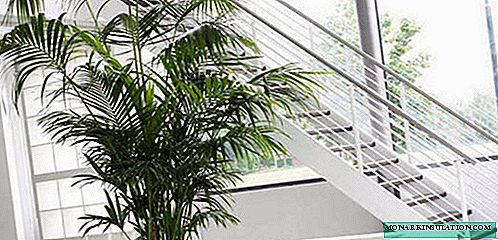
Howea as part of the interior
In winter, howea need little care and illumination. In order for the palm to uniformly grow leaves, it is periodically turned in different directions to the light.
Fertilizer application
During the growing season, young plants need to be fed with special mineral fertilizers for palm trees once every two weeks. Fertilizers can be used for foliage plants containing potassium, magnesium and phosphorus. Use them in liquid form. Adult copies will suffice 1 time per month. In winter, they refuse to feed.
Note! Excess fertilizer will cause them to accumulate in the ground, which will lead to intoxication of the pet.
Sanitary pruning
Forming pruning is not necessary, it is only necessary to remove broken and obsolete leaves at the very base in time, using sharp tools: a knife, pruning shears.
Howe disease
The appearance of brown spots on the entire surface of the leaf indicates a disease - leaf spot (pink rot). The diseased plant is treated with fungicides several times until recovery.
Young leaves suffer from chlorosis, the introduction of trace elements will help to cope with the disease. Weak instances of disease. The reason is often disturbances in the care of a palm tree.
note! Compliance with watering, top dressing, maintaining the right humidity and temperature is the main prevention.
Pests
The appearance of pests cannot be ruled out:
- Spider mites, scutes and mealybugs, which are destroyed by insecticides.
- Thrips, they will be defeated by Aktar.
- Aphids will remove household soap.
When growing, the following problems arise:
- A young plant requires a lot of time - frequent transplants, observing the temperature regime and watering, maintaining humidity.
- Sizes of palm trees exceeding the dimensions of the room.
- Belatedly, measures taken to combat diseases and pests that led to the death of the pet.
Note! All problems that arise are the result of non-compliance with growing conditions and non-compliance with existing care rules.
Leaf drying
Noticing that the leaves are drying, you must immediately take measures to avoid losing your pet.
The reason may be:
- Lowering the temperature below 18 ° C.
- The presence of tobacco smoke and other harmful substances in the air.
- Dry topsoil.
Elimination of these factors will return the Howe to its normal form.
Howeva is popular at home care for which is not too complicated. All expenditures of time and effort are compensated by a living green miracle, settled in the house and reminiscent of the warm summer and the sea.

